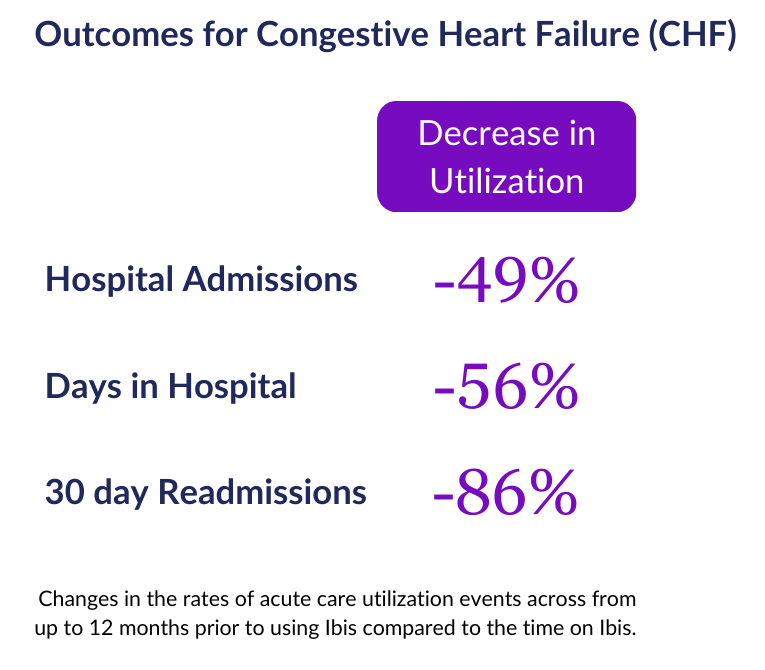Acute care reductions across a range of chronic health conditions
Outcomes that support the entire care continuum for complex patients
The Ibis program enhances patient engagement and reduces acute care use by supporting self-management of comorbidities like diabetes, hypertension, COPD, depression, and anxiety. The table below lists the changes in the rates of acute care utilization events across 1416 patients from up to 12 months prior to receiving the intervention [Ibis] compared to the time receiving the intervention.

Outcomes overview
Outcome Measures
The following acute care utilization measures have been analyzed.
- All-cause hospital admissions, measured as the number of admissions per 1000 patient-years
- All-cause inpatient stays, measured in days per 1000 patient-years
- Readmissions, measured as the number of readmissions within 30 days of discharge per 1000 patient-years
Outcomes Analysis
A subset of Senscio’s population, 1,416 patients who have received RPM services since November 2022, was analyzed for acute care outcomes. The average number of ICD-10 diagnoses for the 1416 patients is 13.6, and their average age is 70.
Analytical Approach
Up to 12 months of Admission, Discharge, and Transfer (ADT) data were collected for patients prior to receiving the Senscio intervention. ADT data are also tracked while the patient receives RPM services, allowing a comparison of the patient’s utilization prior to and during Senscio’s remote patient monitoring services. A pre-post analysis was used to estimate the effect of the intervention on acute care utilization. The approach used the average difference in utilization rates between the time of the intervention and before the start of the intervention.
Disease specific outcomes for patients on Ibis
CHF

Diabetes

Hypertension

COPD

Better care plan adherence through daily reminders
Through the Ibis Platform, patients obtain customized daily notifications for medication management, health tracking, nutrition, fitness, and medical follow-ups. Real-time insights via protocol-driven guidance on vital metrics like weight, oxygen saturation, blood pressure, and blood glucose fluctuations allow patients to actively manage their health. These daily notifications enhance adherence to healthcare plans and improve treatment outcomes.
Fewer acute exacerbations through early detection and self-recovery guidance
The Ibis Platform supports patients at home with a self-recovery protocol delivered via the tablet, accessible 24/7. For example, when a patient records a body weight value exceeding their threshold or report new symptoms consistent with a possible early CHF exacerbation, they are guided through a series of interventions to quickly address the early decline in clinical status and avoid worsening their condition. The Platform also supports self-recovery from exacerbations of associated comorbidities such as diabetes, hypertension, COPD, depression, and anxiety disorders.
Proactive remote interventions and education
The Ibis Platform automatically triages care needs and interventions based on members’ behavioral and vital data. Timely interventions through the Ibis Platform (Self Recovery Guidance) or by the appropriate care team member align the level of clinical intervention to acute and subacute needs. Triggers can include vital deviation from baseline or delays in completing critical self-care tasks. Clinical Team members provide education on diagnosis, disease management, and prescribed medications, fostering patient awareness and encouraging adherence to monitoring protocols.
How can we help?
Drop us a line to see how we can support your organization support complex chronic patients
